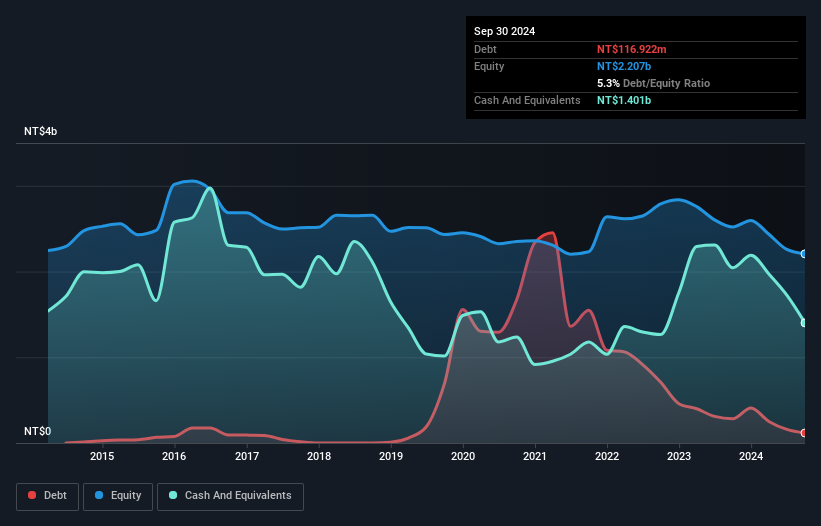Howard Marks put it nicely when he said that, rather than worrying about share price volatility, 'The possibility of permanent loss is the risk I worry about... and every practical investor I know worries about.' So it might be obvious that you need to consider debt, when you think about how risky any given stock is, because too much debt can sink a company. Importantly, Spirox Corporation (TWSE:3055) does carry debt. But is this debt a concern to shareholders?
Why Does Debt Bring Risk?
Debt assists a business until the business has trouble paying it off, either with new capital or with free cash flow. In the worst case scenario, a company can go bankrupt if it cannot pay its creditors. While that is not too common, we often do see indebted companies permanently diluting shareholders because lenders force them to raise capital at a distressed price. By replacing dilution, though, debt can be an extremely good tool for businesses that need capital to invest in growth at high rates of return. When we think about a company's use of debt, we first look at cash and debt together.
See our latest analysis for Spirox
What Is Spirox's Net Debt?
You can click the graphic below for the historical numbers, but it shows that Spirox had NT$116.9m of debt in September 2024, down from NT$282.2m, one year before. However, it does have NT$1.40b in cash offsetting this, leading to net cash of NT$1.28b.

How Strong Is Spirox's Balance Sheet?
According to the last reported balance sheet, Spirox had liabilities of NT$405.3m due within 12 months, and liabilities of NT$155.5m due beyond 12 months. Offsetting these obligations, it had cash of NT$1.40b as well as receivables valued at NT$242.1m due within 12 months. So it actually has NT$1.08b more liquid assets than total liabilities.
This short term liquidity is a sign that Spirox could probably pay off its debt with ease, as its balance sheet is far from stretched. Simply put, the fact that Spirox has more cash than debt is arguably a good indication that it can manage its debt safely. There's no doubt that we learn most about debt from the balance sheet. But it is Spirox's earnings that will influence how the balance sheet holds up in the future. So if you're keen to discover more about its earnings, it might be worth checking out this graph of its long term earnings trend.
Over 12 months, Spirox made a loss at the EBIT level, and saw its revenue drop to NT$918m, which is a fall of 36%. To be frank that doesn't bode well.
So How Risky Is Spirox?
By their very nature companies that are losing money are more risky than those with a long history of profitability. And in the last year Spirox had an earnings before interest and tax (EBIT) loss, truth be told. And over the same period it saw negative free cash outflow of NT$93m and booked a NT$156m accounting loss. While this does make the company a bit risky, it's important to remember it has net cash of NT$1.28b. That means it could keep spending at its current rate for more than two years. Even though its balance sheet seems sufficiently liquid, debt always makes us a little nervous if a company doesn't produce free cash flow regularly. The balance sheet is clearly the area to focus on when you are analysing debt. But ultimately, every company can contain risks that exist outside of the balance sheet. We've identified 1 warning sign with Spirox , and understanding them should be part of your investment process.
If, after all that, you're more interested in a fast growing company with a rock-solid balance sheet, then check out our list of net cash growth stocks without delay.
New: Manage All Your Stock Portfolios in One Place
We've created the ultimate portfolio companion for stock investors, and it's free.
• Connect an unlimited number of Portfolios and see your total in one currency
• Be alerted to new Warning Signs or Risks via email or mobile
• Track the Fair Value of your stocks
Have feedback on this article? Concerned about the content? Get in touch with us directly. Alternatively, email editorial-team (at) simplywallst.com.
This article by Simply Wall St is general in nature. We provide commentary based on historical data and analyst forecasts only using an unbiased methodology and our articles are not intended to be financial advice. It does not constitute a recommendation to buy or sell any stock, and does not take account of your objectives, or your financial situation. We aim to bring you long-term focused analysis driven by fundamental data. Note that our analysis may not factor in the latest price-sensitive company announcements or qualitative material. Simply Wall St has no position in any stocks mentioned.
About TWSE:3055
Spirox
Engages in the provision of integrated solutions to the semiconductor and FPD industries in Taiwan, China, and internationally.
Adequate balance sheet with minimal risk.
Market Insights
Community Narratives



